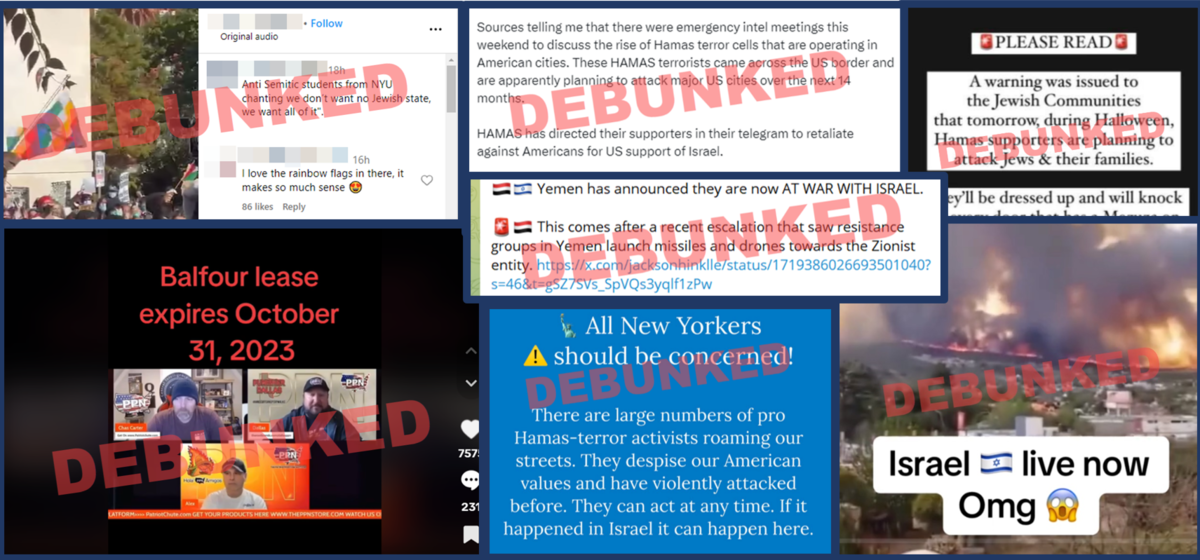

Fight Antisemitism
Explore resources and ADL's impact on the National Strategy to Counter Antisemitism.
Introduction
Since the brutal Hamas attack on Israel on October 7, and as Israel continues its military response in Gaza, ADL has observed the proliferation of inflammatory language, misinformation about the conflict, and hateful content online.
To better understand the prevalence of these experiences, the Center for Tech and Society at ADL surveyed 1,484 Americans on October 31st and November 1st on the types of hate and misinformation they are being exposed to relating to the conflict on social media. In addition, the 1,118 (75%) of those surveyed who said they play online games were asked about hate and misinformation they had been exposed to in online games.
Methodology
We polled 1,484 adults living in the United States on October 31- November 1, 2023 using Prolific, a nationally representative survey platform. After providing basic demographic information (10 questions), participants indicated whether, following October 7th, they had been exposed to content on social media (e.g. online or mobile platforms like TikTok, Facebook, YouTube, Twitch, etc.) that they believed was hateful. Categories of hateful content measured included antisemitic or anti-Jewish, anti-Israeli, Islamophobic or anti-Muslim, or anti-Arab content. Participants then indicated whether, following October 7th, they had viewed or been exposed to topics or content constituting misinformation. Categories of misinformation included distortions that Israel or Jews want to commit genocide against all Palestinians, claims that Israel or Jews started the war to move non-whites to the USA, claims that Israel or Jews purposely coordinated Hamas’s attack, reports that Israel hired “crisis actors” to exaggerate the conditions of the war, allegations that armed terrorists in the U.S. are disguising themselves as Jews, claims that Hamas militants are planning to invade the U.S. via the southern border, claims that all Palestinians support Hamas, and claims that all Palestinians are members of Hamas. Participants who indicated via filter question that they played video games on a computer, console, or mobile device in the past six months were then asked whether they had been exposed to hateful or misleading content in online multiplayer games (e.g. Call of Duty, League of Legends, Roblox). Participants indicated whether they had viewed or been exposed to the same categories of hateful or misleading content assessed above. Below are some main takeaways from the survey.
Key Findings
Exposure to Misinformation about the war between Israel and Hamas:
Despite several platforms publicly stating their ongoing efforts to manage mis- and disinformation in the context of the war, a significant majority of Americans reported that they are still seeing misinformation online.
70% of participants stated that they had been exposed to at least one of several examples of misinformation or hate related to the conflict on social media. For example, 52% of respondents stated that they had viewed or been exposed to distortive content claiming that “Israel or Jews want to commit genocide against all Palestinians,” and 41% saw “claims that all Palestinians support Hamas.” Additionally, 14% also reported seeing at least one of these pieces of misinformation while playing online multiplayer games.
Exposure to Hateful Content:
Participants also reported a significant level of exposure to hateful content directed at key identities associated with the conflict. 68% of respondents said that they had seen or been exposed to at least one example of hateful content directed towards Jews, Israelis, Muslims, Palestinians, or Arabs. Of these options, Anti-Israeli and Anti-Palestinian content were reported as having been viewed the most, by 53% and 48% of participants respectively. More general antisemitic or anti-Jewish and Islamophobic or anti-Muslim content were reported at a slightly lower frequency, at 39% and 34% respectively.
Conclusion
Americans are experiencing the war through an online landscape rife with misinformation and hateful content, at a time when many platforms have cut back their trust and safety teams who are responsible for enforcing the companies’ rules against these very things.









